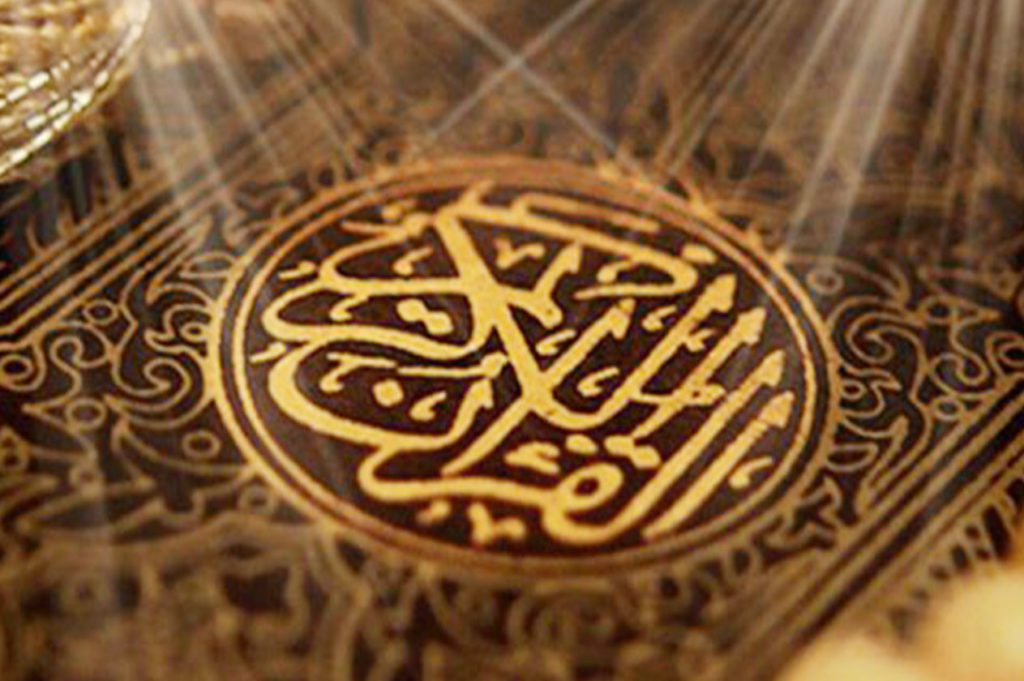
بِسۡمِ اللّٰہِ الرَّحۡمٰنِ الرَّحِیۡمِ
وَ التِّیۡنِ وَ الزَّیۡتُوۡنِ ۙ﴿۱﴾ وَ طُوۡرِ سِیۡنِیۡنَ ۙ﴿۲﴾ وَ ہٰذَا الۡبَلَدِ الۡاَمِیۡنِ ۙ﴿۳﴾ لَقَدۡ خَلَقۡنَا الۡاِنۡسَانَ فِیۡۤ اَحۡسَنِ تَقۡوِیۡمٍ ۫﴿۴﴾ ثُمَّ رَدَدۡنٰہُ اَسۡفَلَ سٰفِلِیۡنَ ۙ﴿۵﴾ اِلَّا الَّذِیۡنَ اٰمَنُوۡا وَ عَمِلُوا الصّٰلِحٰتِ فَلَہُمۡ اَجۡرٌ غَیۡرُ مَمۡنُوۡنٍ ؕ﴿۶﴾ فَمَا یُکَذِّبُکَ بَعۡدُ بِالدِّیۡنِ ؕ﴿۷﴾ اَلَیۡسَ اللّٰہُ بِاَحۡکَمِ الۡحٰکِمِیۡنَ ٪﴿۸﴾
By the fig and the olive; and by Mount Toor of the Seeneen- Mount Sinaai; and by this peaceful city. Indeed, We have created Man in the best composition. Then do We abase him to the lowest of the low. Except those who believe and carry out righteous deeds; for them is an unending reward. Then what can make you, after all this, deny the Requital (the Day of Judgement)? Is Allah not the most just of all judges?
وَ التِّیۡنِ وَ الزَّیۡتُوۡنِ ۙ﴿۱﴾ وَ طُوۡرِ سِیۡنِیۡنَ ۙ﴿۲﴾ وَ ہٰذَا الۡبَلَدِ الۡاَمِیۡنِ ۙ﴿۳﴾
By the fig and the olive; and by Mount Toor of the Seeneen- Mount Sinaai; and by this peaceful city.
In these three verses, Allah Ta‘ala takes four oaths on certain sacred places of the world. These places are places of great blessings and were once centres of guidance for various Ambiyaa (‘alaihimus salaam).
“Fig and olive” mentioned in the first verse refer to the blessed lands of Palestine and Syria, the places where these fruits are grown in abundance and where many of the Ambiyaa (‘alaihimus salaam) preached the deen of Allah Ta‘ala. Palestine, in particular, was the birthplace of Hazrat Isa (‘alaihis salaam) and the centre where he preached guidance.
Tur, the Mount of Sinaai, is the mountain on which the Torah was given to Hazrat Musa (‘alaihis salaam).
“This peaceful city” refers to the holy city of Makkah Mukarramah, in which the killing of any person or animal is prohibited. The sacred and peaceful city of Makkah Mukarramah is the greatest and most blessed city from all the cities in the world, and is the birthplace and homeland of the final messenger of Allah Ta‘ala, Rasulullah (sallallahu ‘alaihi wasallam) prior to him migrating to Madinah Munawwarah.
Hence, in these verses, Allah Ta’ala takes an oath upon these blessed lands on account of the abundant blessings found in them.
لَقَدۡ خَلَقۡنَا الۡاِنۡسَانَ فِیۡۤ اَحۡسَنِ تَقۡوِیۡمٍ ۫﴿۴﴾ ثُمَّ رَدَدۡنٰہُ اَسۡفَلَ سٰفِلِیۡنَ ۙ﴿۵﴾ اِلَّا الَّذِیۡنَ اٰمَنُوۡا وَ عَمِلُوا الصّٰلِحٰتِ فَلَہُمۡ اَجۡرٌ غَیۡرُ مَمۡنُوۡنٍ ؕ﴿۶﴾ فَمَا یُکَذِّبُکَ بَعۡدُ بِالدِّیۡنِ ؕ﴿۷﴾ اَلَیۡسَ اللّٰہُ بِاَحۡکَمِ الۡحٰکِمِیۡنَ ﴿۸﴾
Indeed, We have created Man in the best composition. Then do We abase him to the lowest of the low. Except those who believe and carry out righteous deeds; for them is an unending reward. Then what can make you, after all this, deny the Requital (the Day of Judgement)? Is Allah not the most just of all judges?
After taking four oaths on these blessed lands, Allah Ta‘ala mentions the message directed to man through the oaths taken. Allah Ta‘ala says, “Indeed We have created Man in the best composition”. In other words, man should reflect upon the fact that just as Allah Ta‘ala has chosen these lands to be the greatest and most blessed lands in the world, similarly Allah Ta‘ala has chosen man to be His best creation in the world and created him in the best composition.
If man reforms his life and follows the guidance sent down by Allah Ta’ala to Rasulullah (sallallahu ‘alaihi wasallam), then he will be able to even surpass the angels in rank. However, if he debases himself by leading a life of sin and evil, then he will be abased to the lowest of the low in the sight of Allah Ta‘ala.
Some commentators explain that “the best composition” mentioned in the aayah refers to the physical structure and faculties of man which are at their peak during the earlier phase of his life. However, as soon as he approaches old age, he begins to lose his external beauty and physical strength, until he reaches the lowest stage of weakness. Hence, in this verse, Allah Ta‘ala mentions that though his physical condition declines and deteriorates, he is still honoured by Allah Ta‘ala, and the good deeds which he had carried out will continue to increase in the Hereafter.
فَمَا یُکَذِّبُکَ بَعۡدُ بِالدِّیۡنِ ؕ﴿۷﴾ اَلَیۡسَ اللّٰہُ بِاَحۡکَمِ الۡحٰکِمِیۡنَ ﴿۸﴾
Then what can make you, after all this, deny the Requital (the Day of Judgement)? Is Allah not the most just of all judges?
In the preceding verses, Allah Ta‘ala reminds man that Allah Ta‘ala has created him in the best composition and made him unique from all other creations. However, Allah Ta‘ala also informs him that his progress and success is based upon him leading a life of piety and righteousness. If he leads a life of sin, he will be degraded to the lowest of the low and will lose his honour in the sight of Allah Ta‘ala. Similarly, he is informed that after enjoying a period of strength, his strength will gradually wane and he will eventually reach old age. Therefore, he should take lesson from this and realize that after this life, there is another life to come i.e. the everlasting life of the Hereafter.
In this verse, Allah Ta‘ala informs man regarding his end, that finally he will reach the grave and will have to stand before Allah Ta‘ala on the Day of Qiyaamah. Allah Ta‘ala says, “Then what can make you, after all this, deny the Requital (the Day of Judgement)?” In other words, when man had seen the changes in his life and realized that one day, he will pass away, then how is it that he rejects the life of the Hereafter?
 Ihyaaud Deen An Effort to Revive Deen in Totality
Ihyaaud Deen An Effort to Revive Deen in Totality


